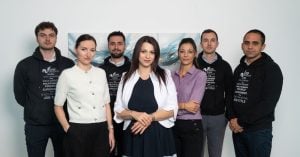The effects of climate change have been considered a serious problem threatening communities, businesses, and governments. According to the PwC Net Zero Future50 report, investments in climate technologies in Central and Eastern Europe increased from $10.6 million in 2013 to $398 million in 2020 and $502 million in the first half of 2021. Despite that fact, data shows that decarbonization is simply not moving quickly enough. PwC UK’s Net Zero Economy Index, as well as the Climate Action Tracker (CAT), confirm such conclusions.
Even if all national commitments, long-term ambitions, and net zero targets are met, CAT projected at the end of COP26 that we are on track for 1.8°C of warming. What’s more, even with the climate issue becoming increasingly important, the risk of getting overshadowed by pressing political concerns is rather high.
An unfolding geopolitical crisis following Russia’s invasion of Ukraine, which tends to shift the emphasis of most European nations, is one of the causes that might have a lot of negative effects on climate tech startups in CEE. And this one meaningful demonstration of global intentions is definitely not the only direct threat to local economies that may make climate commitments less important.
This potential shift is especially relevant to the CEE region. Even though a recent European Investment Bank study found that 78% of Europeans are more concerned about climate change than people in China (65%) or the United States (63%), is it likely that current geopolitical challenges will become a roadblock to the CEE region’s fight against global warming?
There are a number of reasons why this may not be the case. When it comes to addressing climate change, innovative business models with great breakthrough potential are becoming the norm. There is a noteworthy new growing generation of climate tech startups that are introducing digital innovation to solve emission-intensive ways of running business. Added to that, the growing eco-consciousness in European society has also an impact on regional investors who are drawn to climate-tech startups.
When money talks, CEE capital investors are more open to funding startups that are motivated by regional challenges. Kasia Zalewska, an impact angel investor from Ragnarson believes that “a founder with great ideas on how to bring the impact to the table but who lacks business skills is exactly someone who impacts investors can help”. She and her team, as well as similar new-generation investors, are willing to engage in innovative startup projects that make positive environmental contributions. When impact angel investors like Kasia evaluate startups, the most critical factor is purpose alignment.
Overall, investments by Ragnarson cover carbon emission reduction in a variety of formats. However, each startup is evaluated with adequate modeling, which results in a detailed estimate of CO2 emission reduction. Global Changer, for instance, provides a web app climate control center, which is a one-stop platform for everything regarding emissions and assists businesses in organizing and implementing CO2 reduction objectives. It’s an excellent example of a company that enables businesses to reduce their environmental harm.
Kasia Zalewska says that in certain cases, her team decided to put money into startups that have an indirect impact on carbon emissions but make a meaningful difference. Let’s take SAIZ, which is a B2B SaaS AI startup that significantly reduces product returns, the largest cost lever in e-commerce and a serious waste and pollution generator.
As a new wave of climate-driven startups and angel investors evolves, providing new use case innovations to capitalize on, regulatory structures are also striving to align with governments’ net zero goals. As a result, VCs have more opportunities to invest and become increasingly eager to get involved.
The CEE region is still not number one in Europe in terms of the number of climate tech firms, with the UK considered to be the leader in this area. Yet, with relatively high CO2 emissions and insufficient actions taken to meet national Paris Agreement commitments, CEE regional tech startups have a significant potential to grow. Geopolitical concerns will not erase environmental threats; on the contrary, new startups backed by private equity are likely to have even more climate problems to solve with their ideas.








